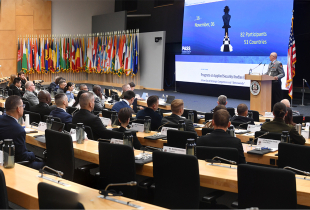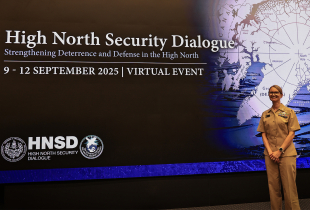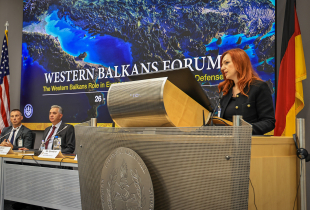
Central Asia Ambassadors and Decisionmakers Meet at Marshall Center to Discuss Regional Challenges
By James E. Brooks
GCMC Public Affairs
George C. Marshall European Center for Security Studies
GARMISCH-PARTENKIRCHEN, Germany (May 20, 2016) – Ambassadors from the United States and Germany joined key Central Asia policymakers, military, diplomats and academic leaders at the George C. Marshall European Center for Security Studies for a three-day symposium devoted to finding ways to respond to common challenges in the region, May 17-20.
The symposium was sponsored by the U.S. Department of Defense and the German Military of Defense as a continuation of talks that began in 2013.
“This is not the first time we have a symposium focused on Central Asia security. In my opinion, this meeting is long overdue. The last time we had a symposium like this, Daesh, or ISIS or ISIL or Islamic State, call it what you will, truly did not exist. In 2013, we talked about extremism but the focus was on Afghanistan and the Taliban. Today, the dialogue about the republics of central Asia and the threats to their security are very different. We find ourselves today in a new environment and one that is potentially more dangerous that the one we anticipated a couple years ago. It is a good time to take stock and this was a great group to do so,” said retired Army Lt. Gen and Marshall Center Director Keith Dayton.
The symposium was divided into eight specific sessions. Each was designed to explore specific aspects of countering different aspects of extremism through discussion of problems, causes, policy options and expected outcomes through collaboration. German, U.S. and NATO regional interests; alternative strategies in Central Asia; economic development, extremist ideologies, its narratives and recruitment were areas explored.
Marshall Center Program Director on Central Asia, Dr. Greg Gleason, said this part of the world is different than other regions of the world and an event like this more important.
“When you look at parts of eastern Europe like the Balkans, the nations are western leaning. In central Asia, they are not. These nations don’t belong to NATO. They’re not cooperating in any coalition like the 66-nation coalition against ISIL. Central Asia is a completely different part of the world. Geographically, I can’t see them ever becoming a part of the NATO alliance. You are not only dealing with countries that were formerly behind the Russian wall, but they’re distant from us in culture as well. So this symposium is far much different than what we normally do here at the Marshall Center and in some cases, more important,” said Gleason.
Countries who attended were Afghanistan, Estonia, Germany, Kazakhstan, Kyrgyzstan, Tajikistan, Turkmenistan, Uzbekistan, and the United States.
“This symposium has been a great opportunity to bring everyone together at one time and discuss issues that matter the most. This is one of the main reasons we advocated doing this symposium. You don’t have the opportunity to do this very often-to take a few days away from daily duties and look for new solutions to challenges in Central Asia,” said U.S. Ambassador to Kazakhstan George Krol.
This symposium in one of more than 100 non-resident and outreach programs planned by the George C. Marshall European Center each year. The Marshall Center provides the U.S. and Germany with a powerful diplomatic tool where nations can gather for meaningful engagement at the strategic-level for positive policy outcomes.


